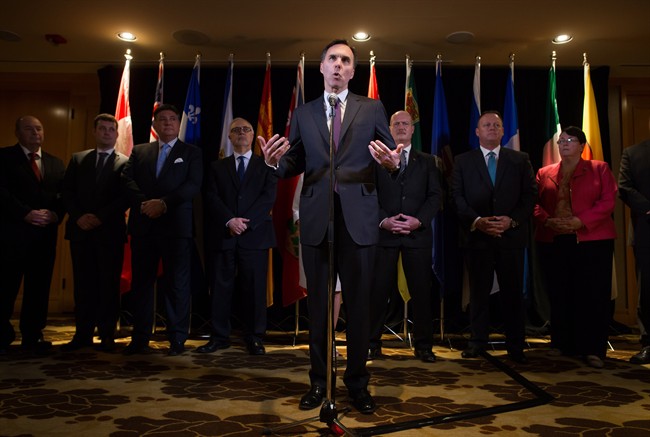OTTAWA – The federal government expects the proposed expansion of the Canada Pension Plan to curb economic and employment growth slightly in the short term before boosting both of them in the long run.

The Finance Department released new projections Monday showing what Canadians can expect if Ottawa moves ahead with the tentative CPP agreement it reached with most provinces.
The changes would gradually increase mandatory contributions to the public plan as a way to boost the program’s benefits for future generations of retirees.
WATCH: Changes to the Canada Pension Plan and what that can mean for you

The Liberal government has been trying to sell the CPP proposal amid concerns about its impact on the already weak economy. For reform to proceed, however, Ottawa still needs a signature from either British Columbia or Quebec.
On Monday, the Finance Department predicted the changes would have a temporary impact on jobs – lowering current employment-growth projections by up to 0.07 per cent between 2019 and 2025.
It also expects the adjustments to trim the forecast for Canada’s real gross domestic product – a measure of economic growth – by up to 0.05 per cent over the same period.
READ MORE: Bill Morneau agrees to appear before finance committee on CPP, but timeline unclear
But beyond 2025, the government said the pension changes would help the economy, lifting GDP growth by up to 0.09 per cent and boosting employment by 0.06 per cent.
The new projections were released ahead of Finance Minister Bill Morneau’s appearance before the House of Commons finance committee, where he was asked to address concerns that enhancing public pensions could further damage the struggling economy.
“We’re focused on how we can improve the retirement security for Canadians and do it in a way that’s going to enhance our economy over the long term,” Morneau told reporters after his testimony.
WATCH: Canadians misinformed on CPP expansion deal, says CFIB

“We know that Canadians who feel more secure – because they have a better retirement situation – are going to be better able to be active participants in our economy.”
Interim Conservative leader Rona Ambrose described CPP expansion Monday as a “tax hike” that will cost families thousands of dollars.
“We all know tax hikes do not create jobs, tax hikes do not spur on the economy,” Ambrose said.
“Now we know it will also result in job losses.”
READ MORE: Canada Pension Plan makeover was swift in policy-making terms
Morneau has pushed hard to change the CPP, but the expansion is not yet a lock as Ottawa waits for B.C., or possibly even Quebec, to support the deal.
Initially, every province except Quebec backed the agreement in principle and agreed to ratify it by a July 15 deadline.
B.C. later declined to finalize the deal by that date, saying it needed more time to explain it to the public and to seek feedback.
A deal to reform the CPP needs the signatures of a minimum of seven provinces representing at least two-thirds of Canada’s population.
The federal Liberals expect B.C. to back the plan and they intend to table CPP legislation this fall.
Ontario Finance Minister Charles Sousa, perhaps the strongest provincial supporter of an expanded CPP, said in an interview Monday that he’s “very confident” the deal will move forward.
“I don’t think they’re holding out,” Sousa said when asked if B.C. might have delayed the process as a negotiation tactic.
“I think they just want to make certain that as they move into the next general election that they’ve done their due diligence to reaffirm with the public and with businesses that they’re working together for their benefit, too.”
Business owners, who would have to boost contributions for their workers under CPP expansion, are among those who are concerned.
Dan Kelly, president of the Canadian Federation of Independent Business, said Monday that some employers have warned that the CPP changes would likely force them to eliminate jobs.
“At a time when the economy is as shaky as it is, it just seems very risky to be embarking upon this path,” Kelly said in an interview.
“That seems to be the opposite of what we need in the short term.”
The federal Finance Department estimates that 1.1 million families – or about a quarter of Canadian families -are not saving enough for retirement.
Under the proposal, contributions to the CPP by employees and employers would gradually increase over seven years starting in 2019. Once the changes are fully implemented in 2025, Canadians would pay between $9 and $42 more into the plan every two weeks.
The CPP changes would eventually provide future retirees with one-third of their average annual incomes, up from one-quarter. They would also increase the maximum amount of income subject to CPP by 14 per cent, to $82,700.
The reform would also provide a tax deduction – instead of a tax credit – on the increased contributions by employees. The federal government expects that adjustment to reduce government revenues by about $710 million by 2021-22.
The changes would also cost about $260 million a year from the public treasury to help offset the additional financial burden that expansion would eventually place on low-income earners. Ottawa would enhance its refundable working income tax benefit to help compensate eligible low-wage earners for the higher pension contributions.



Comments